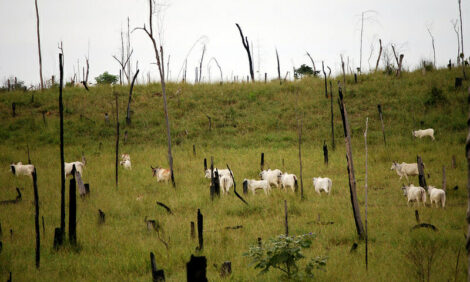



An End to Beef Innovation as CSIRO Lab Closes
AUSTRALIA - The Queensland cattle industry is shocked at the surprise closure of CSIRO’s Rockhampton laboratory because this will reduce research capability at a time when scientific knowledge is integral to helping manage the impacts of climate change on food production.AgForce was not consulted prior to the announcement today and is concerned about the implications of the imminent closure of CSIRO’s Rendell Laboratory, AgForce Cattle president Greg Brown said.
“The Rendell laboratory complex opened in April 1981 and has the largest covered animal facility in the Southern Hemisphere, with more than 5000 square metres of covered animal space and capacity to house 72 cattle individually as well as another 50 in small groups,” Mr Brown said.
“We believe this research capability is crucial if agricultural emissions research is to be effective. The facility also includes gas-exchange respiration chambers and 18 metabolic crates for detailed physiology and biochemical measurements on cattle.
“The Rendell Laboratory also has two climate-controlled rooms, enabling the study of animals under laboratory-controlled tropical conditions, meaning the research carried out in central Queensland has implications for many other extensive beef-producing areas.
“In the context of agriculture adapting to a changing climate and facing pressure to reduce its emissions profile, we think it is critical that climate change research is continued. While some of the science will go to Townsville, AgForce is seeking assurances that all current projects will be completed.
“We are surprised and disappointed that industry was not consulted prior to today’s announcement given that a major refit, including two laboratories and equipment rooms costing more than $3 million, was completed in 2006 and less than two years later this money will be wasted if the labs are sold.”
The Rendell lab operates in close co-operation with the nearby CSIRO/AgForce research station Belmont and although CSIRO has stated Belmont-based research projects will continue, there is concern that the research station may not be as effective after the laboratory shuts down during the next 12-14 months. “Agricultural innovation and the use of new technologies in food production are vital if we are to meet increasing world demand for food, and for domestic consumers to avoid further inflationary pressures on food purchases.
“AgForce will seek assurances from CSIRO that research capabilities in Queensland will not be adversely affected and also hold discussions with CSIRO and other research organisations including the Department of Primary Industries and Fisheries, and Meat and Livestock Australia to ensure current projects can continue.
“Increasing productivity and profitability in rural industries, especially food industries, is the only way that consumers will gain relief from elevated food prices, and this productivity relies on world-leading science. Rendell has been a centre for such research – the major question now is how that can be continued.”
TheCattleSite News Desk


